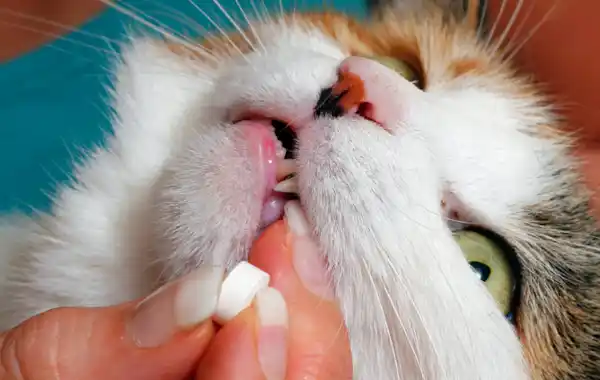How do I treat my cat for worms? Find out how to treat roundworms and tapeworms and spot the signs of worms in your cat.
What are the main kinds of worms that infect cats?
The two main types of worms that infect cats are roundworms and tapeworms. Many cats don't show signs of having worms, but large numbers can cause weight loss, vomiting, diarrhoea and the failure to grow and develop.
![]() What are roundworms?
What are roundworms?
Roundworms are the most common intestinal parasites in cats. There are two different types, Toxocara cati and Toxascaris leonina. Eggs from these worms are passed in the faeces and can be eaten (ingested) by other cats. Eggs can remain infective within the environment for months to years! Infection can also be passed by rodents (an intermediate host) that have eaten eggs and in turn are eaten by a cat.
Toxocara cati is also passed through the milk of the queen (mother) to her kittens. Whenever a queen is infected with roundworm some immature forms of the roundworm (larvae) remain dormant in certain tissues in the body. This causes no harm to the queen but when she gives birth the larvae migrate to the mammary glands and are excreted in the milk. This is a very common route of infection and we can therefore assume that most kittens will be infected with Toxocara cati. It is estimated that 10% of adult cats also shed this worm in their faeces. T leonina is not often seen in the UK.
Kittens are particularly susceptible to roundworms and are often infected from birth.
![]() What are tapeworms?
What are tapeworms?
Tapeworms are long flat worms composed of many segments. Segments containing worm eggs are passed in the faeces. These segments resemble grains of rice in appearance and can sometimes be seen on the hair around the anus of the cat, in the faeces and on the cat's bed.
The most common types of tapeworm that infect cats are called Dipylidium caninum and Taenia taeniaeformis. Dipylidium is transmitted to cats by fleas. Immature fleas (larvae) ingest the eggs of the worm and infection is passed on to a cat when it swallows an infected flea during grooming. It should therefore be assumed that any cat infected with fleas also has Dipylidium, and vice versa.
The other type of tapeworm, Taenia taeniaeformis, is passed on to cats by small rodents (rats and mice). Worm eggs are eaten by rodents and passed on to cats when they hunt and eat an infected rodent. This infection therefore occurs in any cats that hunt.
Don't forget to buy a flea product to eliminate the fleas and their lifestages from your carpets and soft furnishings, and pet bedding should be washed regularly.
How do I treat my cat for worms?
Worms are impossible to prevent. There is no preventative treatment that will stop your cat from becoming infected. However, there are a number of very good products that will kill worms. Remember, however, that most oral worming products are effective at the time of use only, and they do not have a prolonged action.
For kittens, creams or syrups, which are available both from pet stores and vets, are usually the most suitable and easiest to administer. Treatment needs to be every two to three weeks to begin with, lessening to once a month at three to six months, and thereafter once every three months.
Adult cats will also pick up worms from the wider environment, but, having a more developed immunity, do not need to be treated as frequently as kittens. Once a quarter is sufficient for most family pets.
Will my cat's worms infect me?
Roundworms can infect humans. In a few very rare cases, children who ingest the eggs can suffer eye damage or blindness as the worm larvae move through the body causing tissue damage, so it's important to control infection of your cat.
Which worming products should I use?
Some worming medications are effective against both roundworm and tapeworm, while others are only effective against one or the other. It's important to choose the right product for your cat.
Worming medications come in different forms and are now available as liquids, pastes, and granules, as well as injections from your vet and spot-on treatment, which is applied to your cat’s skin and spreads through the skin’s natural oils to protect your pet. Your vet is the best person to ask for advice on the best treatment.
The most commonly used brands of worming medications, all of which are very effective, include: Beaphar, Panacur (Intervet), Drontal cat (Bayer), Droncit injection or spot-on (Bayer), Stronghold spot-on (Pfizer), Milbemax for cat, and Profender spot-on (Bayer).
So, when considering the product you need; find out what it protects against, how it is given to your cat, how long your cat is protected for, and whether it is suitable for your cat, as some products are designed for kittens or pregnant queens.








 What are roundworms?
What are roundworms? What are tapeworms?
What are tapeworms?